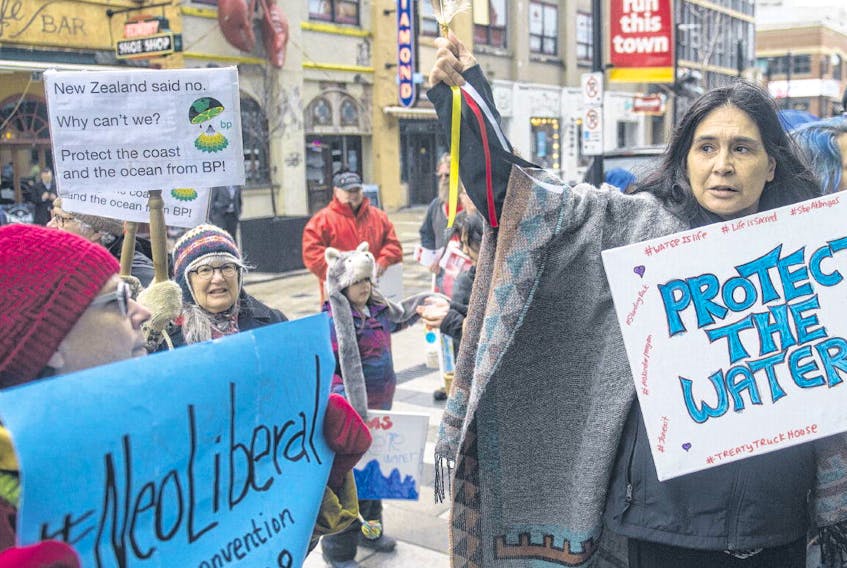he Maritimes Energy Association is applauding the decision to permit BP Canada to drill a deepwater exploration well about 300 kilometres south of Halifax.
“It’s great news,” said Ray Ritcey, the association’s chief executive officer.
“There’s a fair bit of activity going on in the offshore right now but it’s related to the decomissioning of the Sable assets that are off there,” Ritcey said. “That work is going to continue for the next couple of years so this is really good news, to have BP’s one welldrill program approved by the CNSOB (Canada-Nova Scotia Offshore Petroleum Board) and they have all their permits in place.”
Ritcey said he’s hopeful that BP Canada and its rig, Seadrill West Aquarius, will find success with its oil exploration.
“Every citizen in Nova Scotia should be supportive and want BP to have success, recognizing some of the benefits that came to us from some of the Sable projects over the past 20-plus years. It would be nice to have something similar for BP on the oil side.”
Some Nova Scotia citizens are far less bullish on the drilling venture.
“We’re opposed to BP because the risk is too high,” said Robin Tress of the Council of Canadians. “BP is a company with a history of cutting corners to save money in an industry in which, when accidents happen, those accidents can be catastrophic. Our multibillion-dollar fisheries and tourism industries are at risk and those stakes are too high to allow BP to come and drill in our waters.”
Ritcey said there are no airtight assurances in life or in the oildrilling industry. “Those who are against this activity are looking for guarantees that such instances never happen,” Ritcey said of the potential for serious oil spills. “That is simply not practical for anything we do in our lives, whether it’s getting up in the morning and getting out of bed, there are no guarantees that something bad cannot happen. You hope that you have taken all the precautions that you normally do and you get to come home at night. You can’t wish away all the risks that we deal with in our everyday lives. You put programs in place and you make that work to the best of your abilities.”
Despite the approval granted Saturday by the petroleum board for the BP-Canada Aspy D-11 exploration well, Tress argues that all the precautions have not been taken.
“There have always been regulations,” she said.“Every place that there has been a disaster, like the Gulf of Mexico, there have been regulations.
Regulations do
not make risks disappear.”
Eight years ago the Deepwater Horizon, a submersible rig that was leased to BP Canada’s parent company, blew out in the Gulf, resulting in an explosion that killed 11 crew members. The Horizon sank, leaving the well gushing and causing the largest oil spill ever in U.S. waters. The U.S. government estimated the total discharge at 4.9 million barrels before the well was sealed.
“In this case the Gulf oil spill, caused by BP, caused American regulations to change,” Tress said. “Canada did not keep up with some of those changes.”
She said the U.S. subsequently required capping stacks to be immediately available in the event of a blowout.
“In Canada, we allow those (capping stacks) to be up to two weeks away from a drilling rig.”
U.S. regulations no longer allow for the use of Correxit, a dispersant used extensively by BP during the Gulf spill that was toxic to marine ecosystems and animals. Canada still allows its use, Tress said.
The U.S. also mandated that companies simultaneously drill main and relief wells so that the secondary well can be used to relieve the pressure should the main well malfunction. In Canada, the simultaneous well-drilling is not required, she said.
“Any offshore drilling company is only going to live up to whatever standard the government sets and Canada has not set a high standard,” Tress said.
Ritcey said the safety record for drilling in the Atlantic region speaks for itself.
“We have well over 200 wells that have been drilled,” he said. “We’ve had an active development in Nova Scotia for 20-plus years and in Newfoundland; it’s been north of 20-plus years. They have several projects in place and all of those projects have provided a significant economic contribution to their respective provinces and have been very important to the inhabitants of those provinces through royalty payments that have been used for all the purposes that you need government to provide services in a society — hospitals, education, infrastructure and the like.”
Ritcey underscored what Premier Stephen McNeil said during the federal Liberal convention in Halifax on the weekend.
“We’d use some of that (revenue) to put in health care and education and looking after vulnerable citizens,” the premier said.
BP-Canada’s original application was to drill up to seven exploration wells between 2018 and 2022. Tress said other companies, including Statoil and Shell, have leases in the area in various states of approval.
Ritcey said any potential oil production from BP-Canada’s exploration would be years and years away, adding that historically the success rate for an exploratory well resulting in oil production is only about 10 to 20 per cent.
“We wish them nothing but success on their drill becuase, if they are successful, it should lead to further exploration and hopefully development and production,” he said.









